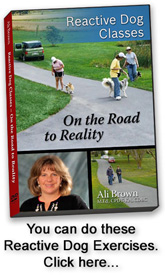More Than Just a Lack of Good Training
Coping with Reactivity requires understanding your dog's issues and working as a team.
Truly Reactive Dogs
A truly reactive dog is not just an ordinary excitable dog lacking in self-control. Nor is he simply a poorly behaved adolescent dog whose bad habits have been ingrained in his behavior patterns, and who needs a few weeks or months of well-guided positive reinforcement training. So it is surprising to see many videos on the internet featuring what are called reactive dogs, and showing that reactive dog problems can be solved in close quarters, in a class setting with multiple dogs all in attendance in the same room, and with consistent good results being obtained in just a few lessons, or even a few hours.
Unfortunately, a truly reactive dog is resistant to consistent good training methods. Re-introduced to the same reactive behavior-producing stimuli shortly after training, or even in the same training session, the problem behavior often reappears, or even presents itself in a different way in a truly reactive dog.
Those are the dogs and owners who tend to gravitate to our reactive classes after trying to solve problems with one or more previous trainers. Most of the six-page behavior history forms that owners must fill out before beginning class, contain descriptions of multiple training failures that have either lead to their dog’s reactivity, or that have failed to improve their dog’s reactivity.
Additionally, many of our best students have owned multiple well-behaved dogs of the same breed for years and are surprised when a new dog presents a set of behaviors they’ve never experienced before.
It is a given that no useful reactive dog remediation can begin without a good foundation in positive motivational training, including the methods that can be found in tens or maybe hundreds of books by reputable trainers. In fact, many of the videos found on-line claiming to lessen the problems of reactive dogs use sound positive motivational methods. Good methods often yield good results for problems that are based on a variety of root causes.
It is when well-executed non-force positive reinforcement training methods don’t produce consistent good results all by themselves, that the methods shown on this Website have their main value.
That said, it is important to note that our methods are simple and easy to do. They do not require any special skills or knowledge. In fact, they look boring. But as with smells that might be boring to a human nose, what dogs experience in these classes is far from boring. The best sense that training is going well is when an owner reports that her dog is “looking forward” to coming to class. That is because in these classes the dog can experience things on his own level in an environment that is not threatening or scary.
Pete Smoyer
Webmaster/Publisher
Author’s note: These observations come from my more than ten years with my wife, Ali Brown, as she’s worked with reactive dogs and their owners. In that time I’ve published two of her books and two DVDs, taken thousands of photos and hours of video, been involved in classes (often as “live bait”), and come to know many of her students and their dogs personally. I’ve also had the opportunity to meet many of the authors and trainers whose work helped to form the foundation of what Ali does in her reactive dog classes.
Among those authors, I find I learned a great deal in working with Leslie McDevitt as she was developing her first DVD, even before her book, Control Unleashed, was published.
Most of all, I had the opportunity to live with Ali’s dog, Acacia, for 11 or so years. In that time Acacia helped define the term reactive for me. And I learned that people with truly reactive dogs have a journey ahead of them that has many interesting twists and turns, and never a dull moment with their dogs.









